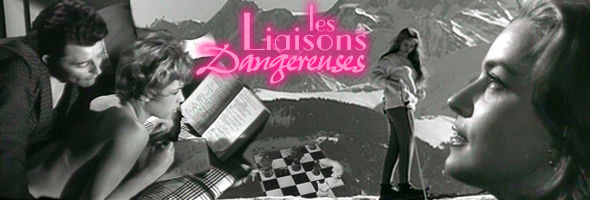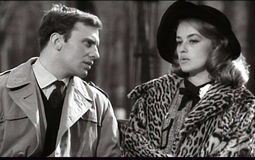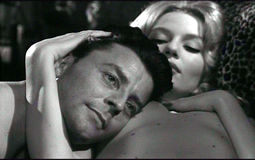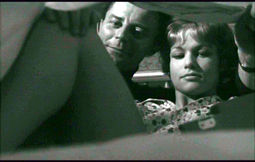
B&W, 1959, 106m.
Directed by Roger Vadim
Starring Jeanne Moreau, Gérard Philipe
Kino Lorber (Blu-ray & DVD) / WS (1.66:1) (16:9), Wellspring (US R1 NTSC) / WS (1.66:1)

B&W, 1959, 106m.
Directed by Roger Vadim
Starring Jeanne Moreau, Gérard Philipe
Kino Lorber (Blu-ray & DVD) / WS (1.66:1) (16:9),
Wellspring (US R1 NTSC) / WS (1.66:1)
 Vadim's rendition is a so thoroughly immersed in ultra-chic, New Wave aesthetics that the characters are transformed from ruthless, Michiavellian into a gallery of disaffected, highly photogenic French actors prancing through the Alpine scenery, occasionally bursting into hysterical fits when they're not rolling around naked by the fireplace. Oo la la!
Vadim's rendition is a so thoroughly immersed in ultra-chic, New Wave aesthetics that the characters are transformed from ruthless, Michiavellian into a gallery of disaffected, highly photogenic French actors prancing through the Alpine scenery, occasionally bursting into hysterical fits when they're not rolling around naked by the fireplace. Oo la la!
 the story in which Valmont has lusted after his adversary for years. There's no point in Juliette offering her body as a reward, since he's already had it. Fortunately Moreau still makes her scheming viper such a vivid, memorable character that the alteration becomes less damaging than one might suspect, and she's fortunately matched by Philipe, an engaging actor who sadly died the year of this film's release. Annette, who was married to Roger during filming, reunited with the director the following year for the classic Blood and Roses, after which the couple split. As usual Vadim transfers his offscreen passion into sensual onscreen visuals, with the camera obviously lingering over her face and body with devoted attention. The supporting cast is no less intriguing, with Jean-Louis Trintignant essentially tweaking his earlier And God Created Woman role as the boyish, easily duped Danceny. (Hard to believe Keanu Reeves would essay the same role almost thirty years later!) Of course, one of the most memorable aspects of the film is its vibrant jazz score, most of it provided by the legendary Thelonious Monk. Other cues were provided by an uncredited Duke Jordan, whose work was largely cast aside but later appeared in a soundtrack album all the same. Jazz music in French cinema was all the vogue at the time (e.g., Miles Davis' score for Louis Malle's L'ascenseur pour l'échafaud), but no one can top Monk's scorching riffs blasting out over the chessboard opening credits. For all Vadim's liberties with the novel, his version is a highly memorable riff on familiar territory and offers a least one highly satisfying improvement in the form of Juliette's comeuppance; we wouldn't dream of spoiling it, but the final moments are appropriately sadistic and far more scalding than getting publicly booed at the opera.
the story in which Valmont has lusted after his adversary for years. There's no point in Juliette offering her body as a reward, since he's already had it. Fortunately Moreau still makes her scheming viper such a vivid, memorable character that the alteration becomes less damaging than one might suspect, and she's fortunately matched by Philipe, an engaging actor who sadly died the year of this film's release. Annette, who was married to Roger during filming, reunited with the director the following year for the classic Blood and Roses, after which the couple split. As usual Vadim transfers his offscreen passion into sensual onscreen visuals, with the camera obviously lingering over her face and body with devoted attention. The supporting cast is no less intriguing, with Jean-Louis Trintignant essentially tweaking his earlier And God Created Woman role as the boyish, easily duped Danceny. (Hard to believe Keanu Reeves would essay the same role almost thirty years later!) Of course, one of the most memorable aspects of the film is its vibrant jazz score, most of it provided by the legendary Thelonious Monk. Other cues were provided by an uncredited Duke Jordan, whose work was largely cast aside but later appeared in a soundtrack album all the same. Jazz music in French cinema was all the vogue at the time (e.g., Miles Davis' score for Louis Malle's L'ascenseur pour l'échafaud), but no one can top Monk's scorching riffs blasting out over the chessboard opening credits. For all Vadim's liberties with the novel, his version is a highly memorable riff on familiar territory and offers a least one highly satisfying improvement in the form of Juliette's comeuppance; we wouldn't dream of spoiling it, but the final moments are appropriately sadistic and far more scalding than getting publicly booed at the opera.
 Released at the height of Vadim's "respectable" period, Les liaisons dangereuses 1960 later enjoyed a high profile reissue on the arthouse and home video circuits in the latea 1980s. Complete with a hilarious English-language introduction by a beatnik-clad Vadim for the limited Astor Pictures release in 1961, the film successfully cashed in on the Stephen Frears adapation with Glenn Close and remained widely available since, despite awful white-on-white subtitles which proved unreadable during outdoor snow scenes. Wellspring's DVD features the original French cut of the film, sans Roger's introduction, and plays far more seriously without it. The 1.66:1 letterboxing appears accurate enough, though it curiously crops some information from the lower text in the opening company title card. Optional yellow subtitles are a tremendous improvement over earlier versions and image quality is excellent, though some noticeable artifacting during mobile camera shots (in the opening party sequence especially) indicates a less than attentive transfer from a PAL source. The only notable extra is a collection of French trailers for the likes of Jules and Jim, Z, and Place Vendôme.
In 2019, Kino Lorber released a drastically improved presentation on separate Blu-ray and DVD editions, featuring a commentary by Kat Ellinger, an isolated music track, and the trailer.
Released at the height of Vadim's "respectable" period, Les liaisons dangereuses 1960 later enjoyed a high profile reissue on the arthouse and home video circuits in the latea 1980s. Complete with a hilarious English-language introduction by a beatnik-clad Vadim for the limited Astor Pictures release in 1961, the film successfully cashed in on the Stephen Frears adapation with Glenn Close and remained widely available since, despite awful white-on-white subtitles which proved unreadable during outdoor snow scenes. Wellspring's DVD features the original French cut of the film, sans Roger's introduction, and plays far more seriously without it. The 1.66:1 letterboxing appears accurate enough, though it curiously crops some information from the lower text in the opening company title card. Optional yellow subtitles are a tremendous improvement over earlier versions and image quality is excellent, though some noticeable artifacting during mobile camera shots (in the opening party sequence especially) indicates a less than attentive transfer from a PAL source. The only notable extra is a collection of French trailers for the likes of Jules and Jim, Z, and Place Vendôme.
In 2019, Kino Lorber released a drastically improved presentation on separate Blu-ray and DVD editions, featuring a commentary by Kat Ellinger, an isolated music track, and the trailer.